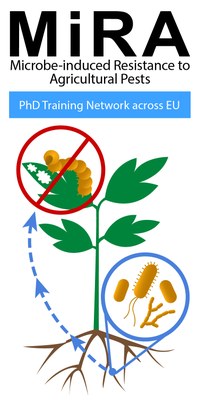Overview of MiRA
The MiRA project trained 15 early stage researchers (ESRs) in basic and applied research on context-dependency of Microbe-induced Resistance (MiR), mechanisms, and impacts on plant performance and other biocontrol organisms. We use this understanding to improve our ability to predict the effectiveness of MiR under different conditions, to select plant and microbial strains with improved context-stability, and to develop better methods for the formulation of microbial inoculants and their application in agriculture. Finally, we will analyse economic prospects and constraints for MiR development and use.
-
Our contribution: Multi-Stakeholder acceptance of using beneficial soil microbes for crop yield and pest suppression in tomato and potato cultivation in Europe
-
Our goal and objectives: The main goal of this project at the University of Bonn is to evaluate consumers’ and farmers’ acceptance and perception of agricultural technologies based on MiR in tomato and potato cultivation in Europe. As with many innovations and products, its’ acceptance and perception of producers and consumers will be an important factor impacting future development and impact.
-
Staff: Ursula Ploll, Prof. Dr. Monika Hartmann, Dr. Johannes Simons
-
Partners/beneficiaries:
Partners: CASI, Spain; Solynta, Netherlands; IGZ, Germany; Newcastle University, United Kingdom; Scottish Agronomy Ltd., United Kingdom; Plant Response, Spain; Ohio State University, USABeneficiaries: University of Copenhagen, Denmark; CSIC, Spain; Netherlands Institute of Ecology, Netherlands; INOQ GmbH, Germany; Koppert Biological Systems, Netherlands; James Hutton Institute, United Kingdom; Utrecht University, Netherlands; CNRS, France; University of Neuchâtel, Switzerland; IDiv, Germany; University of Bonn, Germany
-
Funding: This project has received funding from the European Union’s Horizon 2020 research and Innovation programme under grant agreement No 765290
-
Period: 12.2017 – 11.2021

Ploll, U., Arato, M., Börner, J. & Hartmann, M. (2022). Sustainable Innovations: A Qualitative Study on Farmers’ Perceptions Driving the Diffusion of Beneficial Soil Microbes in Germany and the UK. Sustainability, 14(10), 5749. doi:10.3390/su14105749
Lee Díaz, A. S., Macheda, D., Saha, H., Ploll, U., Orine, D., & Biere, A. (2021). Tackling the Context-Dependency of Microbial-Induced Resistance. Agronomy, 11(7), 1293. doi:10.3390/agronomy11071293
Ploll, U., Weingarten, N., & Hartmann, M. (2022). Promoting Sustainable Agricultural Innovations – Investigating the Effect of Loss and Gain Framing in Videos. Paper presentation: Sharing Behavioural Economics in Person, Annual Conference. Session E1 – Managing Resources, 10.08.2022.
Ploll, U., Yeh, C.-H., Hüttel, S. & Hartmann, M. (2022). Agricultural innovations on a microscopic scale: investigating determinants of farmers’ intention to try innovations based on soil microbes. Poster presentation: Agricultural & Applied Economics Association Annual Meeting. 01.08.2022.
Ploll, U., Arato, M., & Hartmann, M. (2021). Sustainable innovation processes on the farm level: diffusion among farmers and agricultural stakeholders in Germany and the UK. Paper presentation: International Sustainability Transitions Conference. Track 5 - Organizations and industries in transitions, 06.10.2021.
Research Studies

Farmers’ Perceptions Driving the Diffusion of Beneficial Soil Microbes
This research investigates factors that drive the perceptions of soil microbe solutions across three (potential) adopter groups as an input to the design of effective communication strategies to accelerate technology diffusion. The analysis is based on in-depth qualitative interviews in Germany and the UK.

Farmers’ Intention to Try Biostimulants Based on Beneficial Soil-Microbes
This study looks at the behavioural determinants that affect the potential innovation adoption from the farmers’ perspective. A hypothetical product based on beneficial soil-microbes is introduced. Insights from empirical research and different behavioural theories are combined. An online study was conducted among German potato farmers in 2021.

Consumers' Acceptance of Sustainable Food Production Innovations
This study investigates the effect of loss and gain framing on consumers’ attitudes towards, and purchase intentions of, agricultural innovations based on beneficial soil-microbes in tomato production. The effect of information framing is tested with three video clips. This experimental study, with a between-subjects design, was conducted among German consumers in 2022.
Research Poster
